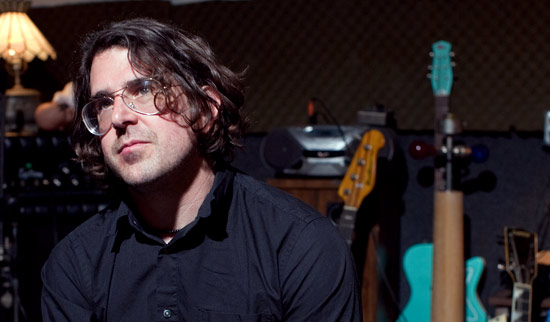Lou Barlow’s relationship with Massachusetts is the stuff of legend now. Decades after his infamous run as the bass player for Dinosaur Jr., and another handful since his last solo album, it doesn’t seem to matter where Barlow actually is; kids in the Massachusetts suburbs still proudly hold on to him as a local success story and an innovator in the world of the lo-fi and downright weird. From the punk overtones of Bakesale to the fuzzy, fragile and personal moments of III, Barlow is constantly changing styles and arrangements to prevent a staleness that we so often see in musicians with careers as long as his, continuing with his latest release Brace The Wave. Barlow plays Great Scott TONIGHT (9/8) with T. Hardy Morris. We were lucky enough to have an opportunity to check in with him beforehand about his Ukulele, the Massachusetts music scene and his personal process.
Allston Pudding: How would you describe your relationship with the Massachusetts music community? Do you feel that over various phases in your career that relationship has changed?
Lou Barlow: I think the proliferation of colleges and college radio in the state made it (and makes it?) a viable environment for new music. More so than almost any other part of the country. Boston supports new bands or, at least, has a long history of being the place that new bands can find an unexpectedly large audience.
It’s also outside of the industry of making music (NYC, LA) so bands can develop relatively untouched by the kind of expectation and pressure that can bring. I was in LA for 17 years so I’m not sure i can speak about my ‘relationship’ to Massachusetts other than to say, as a musician, I am happy to be back and it has always been good to me.
AP:This new album features more ukulele work- for you, what are the advantages to writing on the ukulele?
LB: I wrote my first real songs on ukelele and have been using baritone (the largest uke) or guitars with 4 strings as writing tools since 1985. Less strings means less work and it seemed to me, early on, that people who play standard 6 string only play about 4 strings at once anyway (requiring a lot of muting and curbing my desire to strum) I have never played the ukelele in a standard ukelele tuning or used ukelele strings. I use heavy acoustic strings and come up with my own tunings.
AP:Is there anything that you were listening to or doing that gave you the energy or direction for Brace The Wave?
LB: It was my first time in a studio with exclusively acoustic instruments in a very long time so that , in itself, was energizing. I love acoustic music and feel like there’s a lot of unexplored territory. Towards the end of the recording i heard Carrie and Lowell by Sufjan Stevens and was blown away by it’s simplicity/complexity. So the last track of Brace, “Repeat”, was directly influenced by that.
AP: Having lived in Massachusetts for a while, have you been to shows at Great Scott, and if so, who did you see? Do you have any specific memories there?
LB: I live in Greenfield, MA, so I’m over an hour away from Boston. Allston has energy though. Always has. I lived in Boston from 1989-1997 and loved it. An amazing place to be young and obsessed with music. I mostly went to the clubs in Central Square at that time. TT’s, Middle East.
AP: When you write a song, do you do so with the recording style in mind or do you decide on recording process after the songs are done?
LB: Both. If a song isn’t quite finished when I take it to the studio the recording method can shape the emotional feel of the song and influence the vocal approach and lyrics.
AP: The cover art for Brace the Wave stands apart from cover art that accompanied many of your past projects. It feels more intimate because of its self portrait vibe. For you, does this album feel self reflective?
LB: All of my records are personal but I do think I purposely made this one more spare, focused and intimate by consciously attempting to keep the sound consistent from track to track.
AP: Are there any bands that you’re playing with in the upcoming months that you’re particularly excited to see?
LB: I’m not really sure what I have in store in the upcoming months re: other bands. I’m currently trying to rehearse the new record and figure out a cohesive live set of songs to play!
AP: Do you ever feel pressured by the success of past projects to make new songs sound a certain way? Does it ever feel like people expect something specific from you and if so do you like that or is it frustrating?
LB: I guess, honestly, I feel like most of what I’ve done has failed, either creatively in my own perception or literally in the public/critical response. So I approach each new project feeling like I have a blank slate and grateful that i even have the opportunity to put a record that people will actually try to listen to. I do have an idea of what i like and what works and assume that the closer i get to that the better the response will be. It’s not frustrating but it’s definitely challenging.

